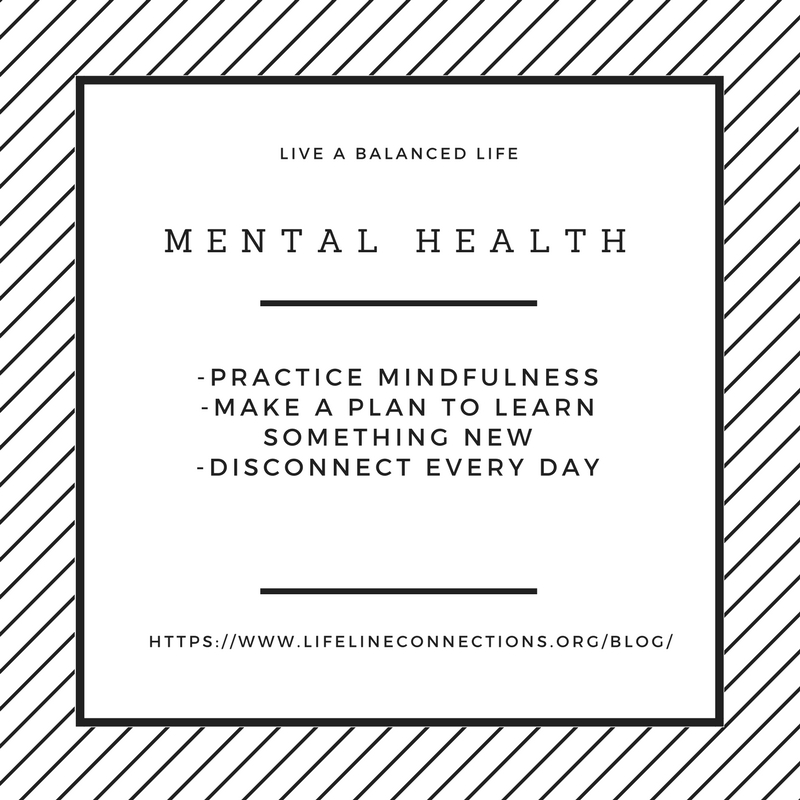
Live a Balanced Life: Mental Health
Live a Balanced Life: Mental Health
To complete my series on living a balanced life this year, I hope that you have could find some simple, helpful information to improve areas of your life that you may have previously ignored. While I believe that choosing the right areas to improve is relative, your personal happiness relies on two things: your choice to live a happy life, and keeping your life balanced physically, emotionally, mentally, and socially.
To live mentally balanced often involves doing several of the things we have already discussed among the other areas of your life that need nurturing. Sleeping enough (but not too much), eating well, and exercise are all things we are encouraged to do for our physical health, but it greatly impacts our mental health as well. Developing healthy relationships, having stimulating conversations, and communicating your boundaries are socially healthy habits that also impact our mental health. Almost anything you can do for yourself emotionally also impacts your mental health.
So here are some suggestions for maintaining your mental health specifically this year.
Practice Mindfulness
We’ve talked about mindfulness before, but I want to reiterate the importance of this habit as a way to improve your mental health. When you are eating dinner, taking a shower, or talking to a friend, practice mindfulness. Be completely in the moment just eating dinner, just showering, just talking to your friend (or just listening is even better!) This practice trains your brain to be able to focus on one thing at a time instead of constantly thinking about what you are doing next. You will become more productive and improve your memory. Some added benefits will be that you will learn to pay more attention to your surroundings and how your body is reacting to triggers, helping you to redirect and retrain those situations to no longer act as triggers. Mindfulness is a way to reconnect to what is going on right now. It is becoming a very common practice and you will likely benefit in many ways from it. Simply google “mindfulness” and I don’t doubt that you will be able to find the right explanation that will fit your ability and situations.
Make a Plan to Learn Something New
Learning new things is one of the best (and most fun!) ways to strengthen your mental health. Use sites like coursera.com or khanacademy.com where you can choose from hundreds of courses from established universities for free. I have personally taken classes on child nutrition and the science of immunizations just because I was curious and I was very happy with how interesting the courses were as well as the quality of what I learned. If you aren’t much of an online learner, look into courses offered by your community or parks and recreation centers. These options can provide you with a myriad of classes that you can also use to connect with other people in your community. If you aren’t able or willing to spend money, you can also consider book clubs or sometimes even courses offered by your local library that are free. If taking a class doesn’t seem interesting but you want to learn a new skill, there are thousands of do-it-yourself videos on Youtube.com. Your possibilities are endless.
Disconnect Everyday
Exclusive of taking an online class, take some time every day to disconnect from your phones or computers to walk in nature or just spend some time alone to reflect or meditate. Some research has shown that children who spend too much time every day watching TV or playing on phones or tablets tend to have difficulty regulating their emotions and exhibit higher likelihoods of developing ADD or ADHD. If that occurs in children, I imagine that the same goes for adults. While I don’t believe in completely doing away with screens, I do think that regulating your time is one way to live a healthy and balanced life.
Lifeline Connections is dedicated to helping you this year by providing outstanding inpatient and outpatient services to aid you in your full recovery. We offer services for co-occurring disorders, as well as inpatient services such as pet therapy and an exercise room. If you live in the Vancouver, WA or Portland, OR areas and you or a loved one are struggling with drug use, please contact us at [email protected] or 360-397-8246 ext 7465. We are here to discuss our options and dedication to helping you live a clean and fulfilling life.
